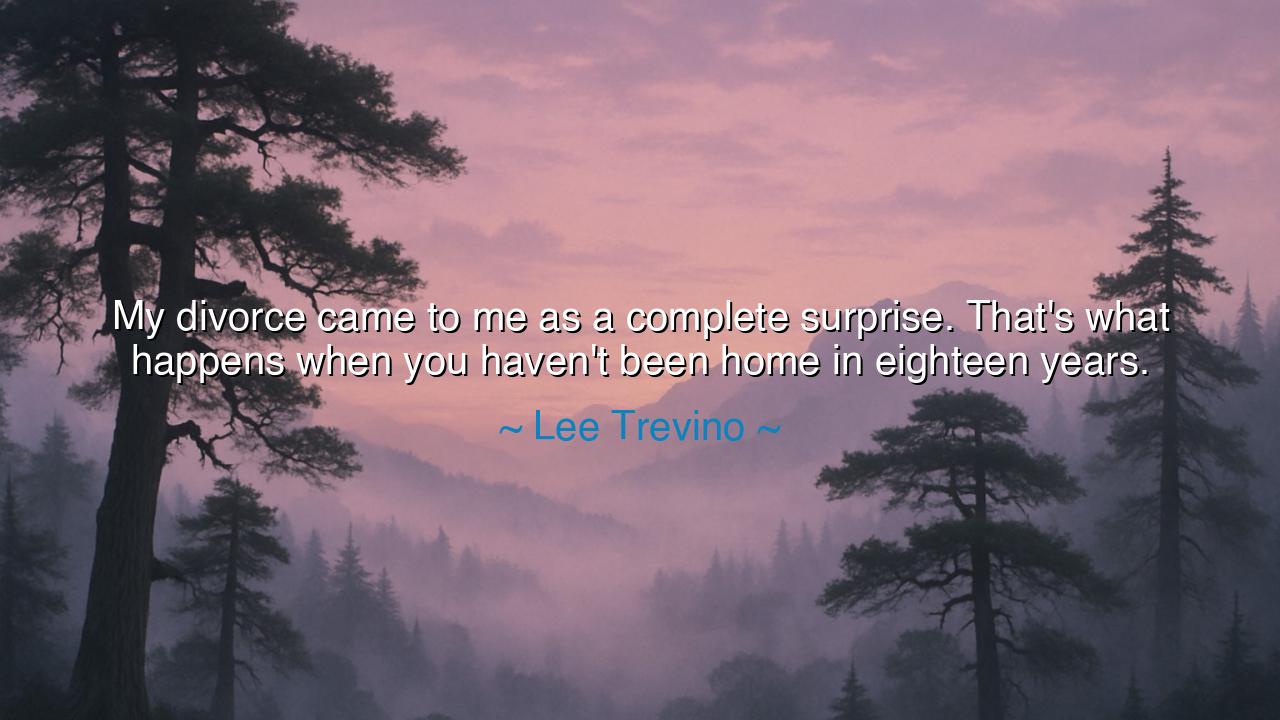
My divorce came to me as a complete surprise. That's what happens
My divorce came to me as a complete surprise. That's what happens when you haven't been home in eighteen years.






When Lee Trevino, the great golfer, said, “My divorce came to me as a complete surprise. That’s what happens when you haven’t been home in eighteen years,” he clothed a sorrowful truth in the humor of a man who had learned too late the cost of his devotion to his craft. Beneath his wit lies a lesson as old as ambition itself: that to chase glory without balance is to risk losing what truly anchors the soul. His words are not merely about marriage — they speak to the eternal conflict between success and presence, between the pursuit of greatness and the quiet duties of love.
In the spirit of the ancients, Trevino’s confession might be seen as the lament of a warrior who conquered every battlefield except the one within his own home. The golf course was his arena, his Olympus, and there he labored with the devotion of a monk before the altar of excellence. But as the years stretched long and the victories piled high, the hearth he left behind grew cold. His words echo the wisdom of countless heroes who found that the road to greatness can be a lonely one. The laughter in his tone hides the ache of recognition: that absence, no matter how noble its cause, erodes even the strongest bonds.
The ancient Greeks told a tale of Odysseus, who, after twenty years of wandering, returned to Ithaca to find his household nearly lost to him. Though he fought bravely at Troy, though he faced monsters and gods, his greatest trial was reclaiming the love he had left behind. Trevino’s story mirrors this myth in modern form — not a war, but a career; not a sea of storms, but the endless travel and toil of ambition. Like Odysseus, he discovered that even a hero can become a stranger in his own home. For the heart does not live by conquest, but by connection.
There is wisdom here for all who seek greatness. Dedication, though noble, becomes a kind of blindness when it consumes the whole of life. The world teaches us to prize achievement above all — the trophies, the applause, the legends written in gold. But the ancients warned of hubris, the pride that blinds a man to his limits. To neglect the home, the loved ones, the quiet spaces where the soul finds rest, is to build an empire upon sand. In Trevino’s humor we hear the echo of regret, the understanding that the world’s applause cannot fill the silence of an empty house.
And yet, there is redemption even in his words. For acknowledgment is the first act of wisdom. To laugh at one’s own folly is to see it clearly, and to see it clearly is to begin to heal. The humor softens the sting, but does not erase the truth: that love requires presence, not promises; time, not titles. The heart, unlike the crowd, does not cheer for distance — it yearns for nearness. In this, Trevino’s reflection becomes not merely a lament but a teaching, passed down like the proverbs of the wise: that no victory is worth the loss of those who waited for you at home.
Consider the story of the emperor Marcus Aurelius, philosopher-king of Rome, who ruled a vast empire but still wrote nightly in his journals about humility, love, and duty to family. Amidst battles and burdens, he sought balance — to remember that the man who governs millions must still be tender to those closest to him. His writings remind us, as Trevino’s words do, that greatness must never come at the expense of the human heart.
So let this be the lesson: return home often — not just in body, but in spirit. Attend to those who love you, for their affection is not eternal by default; it must be nourished like a flame. Work, strive, create — but do not forget to live among those whose laughter gives meaning to your labor. In the end, no one stands upon the mountain forever. Every champion must descend, every traveler must return. And when you do, may you find not an empty house, but a warm hearth, still burning — because you remembered to tend it along the way.






AAdministratorAdministrator
Welcome, honored guests. Please leave a comment, we will respond soon